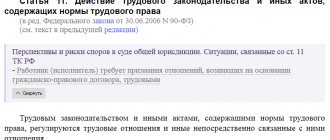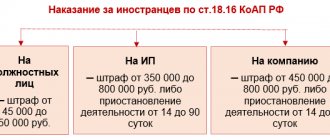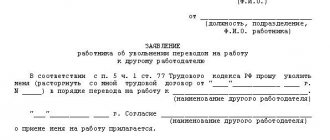An employment contract is a basic document on the basis of which relations between employees and employers are built.
It highlights the rights and responsibilities of both parties. Dear readers! To solve your specific problem, call the hotline or visit the website. It's free.
8 (800) 350-31-84
If an employer violates the terms of an employment contract, he faces disciplinary, administrative and criminal liability.
What is considered a violation
Any disregard for the rules of the Labor Code of the Russian Federation will be a violation. The following groups of illegal actions committed by employers are distinguished:
- At the stage of hiring employees: unlawful refusal to conclude an agreement, refusal to draw up an agreement upon actual admission to work, execution of a GPC agreement instead of an agreement under the Labor Code of the Russian Federation.
- Accepted in the course of work, including: refusal to provide annual paid leave for more than two years in a row, neglect of the procedure for paying wages, refusal to pay overtime, understatement of payments, refusal to provide pay slips, provision of special guarantees provided for certain groups of employees, for example, pre-retirement people, young parents or disabled people.
- At the stage of termination of the contract, including: unjustified disciplinary action in the form of dismissal, failure to provide documents on time, non-payment or late payment of the final payment, incorrect entry into the work book.
Labor inspection fine table
Below is a complete table of possible fines from the labor inspectorate. We recommend that you familiarize yourself with it not only at the moment when the violation was discovered, but also regularly to prevent violations.
You can read the main article on the topic of labor inspection fines by following this link.
A form for downloading the table is available below.
| No. | Offense | Article of the Labor Code containing requirements | Category of violation | Fine, thousand rubles | Fine for repeated violation, thousand rubles | Article | |
| 1 | Evasion from concluding an employment contract | Art. Art. 16, 19.1, 67 | High risk (10 points) | IP | 5-10 | 30-40 | Art. 5.27 hours 4.5 |
| Official | 10-20 | disqualification for 1-3 years | |||||
| Legal entity | 50-100 | 100-200 | |||||
| 2 | Conclusion instead of a civil employment contract | Art. 15 | High risk (10 points) | IP | 5-10 | 30-40 | Art. 5.27 part 4, 5 |
| Official | 10-20 | disqualification for 1-3 years | |||||
| Legal entity | 50-100 | 100-200 | |||||
| 3 | Actual admission of an employee to work by a person who is not authorized to do so by the employer | Article 67.1 | High risk (8 points) | IP | – | – | Art. 5.27 hours 3.5 |
| Official | 10-20 | disqualification for 1-3 years | |||||
| Legal entity | – | – | |||||
| 4 | Inadequate execution of an employment contract (with the exception of payment terms) | Art.67 | Medium risk (6 points) | IP | 5-10 | 30-40 | Art. 5.27 hours 4.5 |
| Official | 10-20 | disqualification for 1-3 years | |||||
| Legal entity | 50-100 | 100-200 | |||||
| 5 | Failure to comply with the procedure for drawing up an employment contract | Art.57 | Low risk (3 points) | IP | 1-5 | 10-20 | Art. 5.27 hours 1, 2 |
| Official | 1-5 | 10-20 or disqualification for 1-3 years | |||||
| Legal entity | 30-50 | 50-70 | |||||
| 6 | Violation of the procedure for maintaining work books | Article 65,66, 309 | Low risk (1 point) | IP | 1-5 | 10-20 | Art. 5.27 hours 1, 2 |
| Official | 1-5 | 10-20 or disqualification for 1-3 years | |||||
| Legal entity | 30-50 | 50-70 | |||||
| 7 | Failure to comply with the procedure for dismissing an employee in the event that an organization is liquidated or ceases operations, or reduces the number or staff of employees | Art. 81 | High risk (10 points) | IP | 1-5 | 10-20 | Art. 5.27 hours 1, 2 |
| Official | 1-5 | 10-20 or disqualification for 1-3 years | |||||
| Legal entity | 30-50 | 50-70 | |||||
| 8 | Termination of an employment contract with violations | Art. Art. 71, 77, 79, 80, 81, 82, 127, 180, 269, 29, 296, 327.6, 384.12 373, 83, 84, | Medium risk (6 points) | IP | 1-5 | 10-20 | Art. 5.27 hours 1, 2 |
| Official | 1-5 | 10-20 or disqualification for 1-3 years | |||||
| Legal entity | 30-50 | 50-70 | |||||
| 9 | Failure to comply with the procedure for attracting car drivers to work on weekends and holidays, to work overtime or work at night | Art. Art. 96, 99 | High risk (10 points) | IP | 1-5 | 10-20 | Art. 5.27 hours 1, 2 |
| Official | 1-5 | 10-20 or disqualification for 1-3 years | |||||
| Legal entity | 30-50 | 50-70 | |||||
| 10 | Violation of the procedure for attracting crew members of civil aviation aircraft of the Russian Federation to work on weekends and holidays, to overtime work, and to work at night | Art. Art. 96, 99 | High risk (10 points) | IP | 1-5 | 10-20 | Art. 5.27 hours 1, 2 |
| Official | 1-5 | 10-20 or disqualification for 1-3 years | |||||
| Legal entity | 30-50 | 50-70 | |||||
| 11 | Failure to provide a car driver with rest between shifts | Art. 103 | High risk (10 points) | IP | 3-4 | – | Art. 14.1 part 3 |
| Official | 3-4 | – | |||||
| Legal entity | 30-40 | – | |||||
| 12 | Violation of the procedure for hiring people to work on weekends, on non-working holidays, to work overtime, to work at night, committed in relation to persons under the age of eighteen | Article 96, 99, 268 | High risk (7 points) | IP | 1-5 | 10-20 | Art. 5.27 hours 1, 2 |
| Official | 1-5 | 10-20 or disqualification for 1-3 years | |||||
| Legal entity | 30-50 | 50-70 | |||||
| 13 | Establishing the duration of working hours per week or per accounting period in excess of the legally defined norm | Art. Art. 91, 92, 104, 173, 174, 176, 320, 333, 350, | High risk (7 points) | IP | 1-5 | 10-20 | Art. 5.27 hours 1, 2 |
| Official | 1-5 | 10-20 or disqualification for 1-3 years | |||||
| Legal entity | 30-50 | 50-70 | |||||
| 14 | Failure to provide employees with rest between shifts, with the exception of car drivers | Art. 103 | High risk (7 points) | IP | 1-5 | 10-20 | Art. 5.27 hours 1, 2 |
| Official | 1-5 | 10-20 or disqualification for 1-3 years | |||||
| Legal entity | 30-50 | 50-70 | |||||
| 15 | Violation of the procedure for recruiting women and people with family responsibilities to work on weekends and holidays, to work overtime, and to work at night | Article 96, 99, 259 | Medium risk (6 points) | IP | 1-5 | 10-20 | Art. 5.27 hours 1, 2 |
| Official | 1-5 | 10-20 or disqualification for 1-3 years | |||||
| Legal entity | 30-50 | 50-70 | |||||
| 16 | Violation of the procedure for hiring people to work on weekends and holidays, to work overtime, to work at night, with the exception of women, persons with family responsibilities, persons under the age of eighteen, disabled people, car drivers, crew members of civil aviation aircraft of the Russian Federation | Art. Art. 96.99 | Medium risk (5 points) | IP | 1-5 | 10-20 | Art. 5.27 hours 1, 2 |
| Official | 1-5 | 10-20 or disqualification for 1-3 years | |||||
| Legal entity | 30-50 | 50-70 | |||||
| 17 | Violation of the procedure for attracting disabled people to work on weekends and holidays, to work overtime, and to work at night | Art. Art. 96.99 | Medium risk (5 points) | IP | 1-5 | 10-20 | Art. 5.27 hours 1, 2 |
| Official | 1-5 | 10-20 or disqualification for 1-3 years | |||||
| Legal entity | 30-50 | 50-70 | |||||
| 18 | Establishing the duration of daily work (shift) in excess of a legally defined norm, except in cases of summarized recording of working hours | Art. Art. 94, 95, 96, 104 | Medium risk (5 points) | IP | 1-5 | 10-20 | Art. 5.27 hours 1, 2 |
| Official | 1-5 | 10-20 or disqualification for 1-3 years | |||||
| Legal entity | 30-50 | 50-70 | |||||
| 19 | Failure to comply with the rules for recording the time actually worked by an employee | Art. Art. 91, 99, 109, 300 | High risk (8 points) | IP | 1-5 | 10-20 | Art. 5.27 hours 1, 2 |
| Official | 1-5 | 10-20 or disqualification for 1-3 years | |||||
| Legal entity | 30-50 | 50-70 | |||||
| 20 | Failure to comply with the procedure for recording working hours | Art. Art. 91, 99, 109, 300 | Medium risk (5 points) | IP | 1-5 | 10-20 | Art. 5.27 hours 1, 2 |
| Official | 1-5 | 10-20 or disqualification for 1-3 years | |||||
| Legal entity | 30-50 | 50-70 | |||||
| 21 | Failure to provide additional leave | Art. 116 | High risk (10 points) | IP | 1-5 | 10-20 | Art. 5.27 hours 1, 2 |
| Official | 1-5 | 10-20 or disqualification for 1-3 years | |||||
| Legal entity | 30-50 | 50-70 | |||||
| 22 | Failure to provide car driver with days off | Art. 110 | High risk (10 points) | IP | 3-4 | – | Art. 14.1 part 3 |
| Official | 3-4 | – | |||||
| Legal entity | 30-40 | – | |||||
| 23 | Failure to provide employees with days off, with the exception of car drivers | Art. 110 | High risk (8 points) | IP | 1-5 | 10-20 | Art. 5.27 hours 1, 2 |
| Official | 1-5 | 10-20 or disqualification for 1-3 years | |||||
| Legal entity | 30-50 | 50-70 | |||||
| 24 | Failure to provide warming and rest breaks | Art. 109 | High risk (7 points) | IP | 1-5 | 10-20 | Art. 5.27 hours 1, 2 |
| Official | 1-5 | 10-20 or disqualification for 1-3 years | |||||
| Legal entity | 30-50 | 50-70 | |||||
| 25 | Violation of the procedure for granting leave | Art. 114 | Medium risk (6 points) | IP | 1-5 | 10-20 | Art. 5.27 hours 1, 2 |
| Official | 1-5 | 10-20 or disqualification for 1-3 years | |||||
| Legal entity | 30-50 | 50-70 | |||||
| 26 | Failure to provide rest and meal breaks | Art. 108 | Medium risk (6 points) | IP | 1-5 | 10-20 | Art. 5.27 hours 1, 2 |
| Official | 1-5 | 10-20 or disqualification for 1-3 years | |||||
| Legal entity | 30-50 | 50-70 | |||||
| 27 | Violation of the deadlines and/or procedure for approving the vacation schedule | Art. 120 | Low risk (2 points) | IP | 1-5 | 10-20 | Art. 5.27 hours 1, 2 |
| Official | 1-5 | 10-20 or disqualification for 1-3 years | |||||
| Legal entity | 30-50 | ||||||
| 28 | Failure of the employer to pay the employee the wages established by the employment contract | Part 6 Article 136 | High risk (10 points) | IP | 1-5 | 10-30 | Art. 5.27 hours 6, 7 |
| Official | 10-20 | 20-30 or disqualification for 1-3 years | |||||
| Legal entity | 30-50 | 50-100 | |||||
| 29 | Payment of wages below the minimum wage | Part 3 Article 133 | High risk (10 points) | IP | 1-5 | 10-30 | Art. 5.27 hours 6, 7 |
| Official | 10-20 | 20-30 or disqualification for 1-3 years | |||||
| Legal entity | 30-50 | 50-100 | |||||
| 30 | Violation of the procedure for payment for work on weekends and holidays | Article 153 | High risk (8 points) | IP | 1-5 | 10-30 | Art. 5.27 hours 6, 7 |
| Official | 10-20 | 20-30 or disqualification for 1-3 years | |||||
| Legal entity | 30-50 | 50-100 | |||||
| 31 | Not paid in full | Part 6 Article 136 | High risk (7 points) | IP | 1-5 | 10-30 | Art. 5.27 hours 6, 7 |
| Official | 10-20 | 50-100 | |||||
| Legal entity | 30-50 | 50-100 | |||||
| 32 | Non-payment of overtime | Article 152 | High risk (7 points) | IP | 1-5 | 10-30 | Art. 5.27 hours 6, 7 |
| Official | 10-20 | 20-30 or disqualification for 1-3 years | |||||
| Legal entity | 30-50 | 50-100 | |||||
| 33 | Violation of the deadline for issuing a payment upon dismissal | Art. 140 | Medium risk (6 points) | IP | 1-5 | 10-20 | Art. 5.27 hours 1, 2 |
| Official | 1-5 | 10-20 or disqualification for 1-3 years | |||||
| Legal entity | 30-50 | 50-70 | |||||
| 34 | Violation of vacation payment deadlines | Part 9 Article 136 | Medium risk (6 points) | IP | 1-5 | 10-20 | Art. 5.27 hours 1, 2 |
| Official | 1-5 | 10-20 or disqualification for 1-3 years | |||||
| Legal entity | 30-50 | 50-70 | |||||
| 35 | Violation of the payment procedure for night work | Article 154 | Medium risk (6 points) | IP | 1-5 | 10-30 | Art. 5.27 hours 6, 7 |
| Official | 10-20 | 20-30 or disqualification for 1-3 years | |||||
| Legal entity | 30-50 | 50-100 | |||||
| 36 | Salary payment deadlines have not been established | Article 136 | Medium risk (6 points) | IP | 1-5 | 10-20 | Art. 5.27 hours 1, 2 |
| Official | 1-5 | 10-20 or disqualification for 1-3 years | |||||
| Legal entity | 30-50 | 50-70 | |||||
| 37 | Violation of the deadline for payment of wages | Part 6 Article 136 | Medium risk (5 points) | IP | 1-5 | 10-20 | Art. 5.27 hours 1, 2 |
| Official | 1-5 | 10-20 or disqualification for 1-3 years | |||||
| Legal entity | 30-50 | 50-70 | |||||
| 38 | Failure to issue a pay slip to an employee | Article 136 | Low risk (1 point) | IP | 1-5 | 10-20 | Art. 5.27 hours 1, 2 |
| Official | 1-5 | 10-20 or disqualification for 1-3 years | |||||
| Legal entity | 30-50 | 50-70 | |||||
| 39 | Non-payment of severance pay under Art. 178 Labor Code of the Russian Federation | Article 178 | High risk (9 points) | IP | 1-5 | 10-30 | Art. 5.27 hours 6, 7 |
| Official | 10-20 | 20-30 or disqualification for 1-3 years | |||||
| Legal entity | 30-50 | 50-100 | |||||
| 40 | Non-payment of average earnings during a mandatory medical examination | Art. 185 | Medium risk (6 points) | IP | 1-5 | 10-30 | Art. 5.27 hours 6, 7 |
| Official | 10-20 | 20-30 or disqualification for 1-3 years | |||||
| Legal entity | 30-50 | 50-100 | |||||
| 41 | Violation of the procedure for applying disciplinary sanctions | Article 193 | Medium risk (6 points) | IP | 1-5 | 10-20 | Art. 5.27 hours 1, 2 |
| Official | 1-5 | 10-20 or disqualification for 1-3 years | |||||
| Legal entity | 30-50 | 50-70 | |||||
| 42 | Admission to work without training and testing of knowledge on labor protection | Art. Art. 212, 225 | High risk (10 points) | IP | 15-25 | 30-40 or suspension of activities up to 90 days | Art. 5.27.1 part 3, 5 |
| Official | 15-25 | 30-40 or disqualification for 1-3 years | |||||
| Legal entity | 110-130 | 100-200 or suspension of activities up to 90 days | |||||
| 43 | Admission to work without undergoing preliminary or periodic medical examinations, mandatory medical examinations at the beginning of the working day (shift) | Article 69, 212, 213, 219, 266 | High risk (10 points) | IP | 15-25 | 30-40 or suspension of activities up to 90 days | Art. 5.27.1 part 3, 5 |
| Official | 15-25 | 30-40 or disqualification for 1-3 years | |||||
| Legal entity | 110-130 | 100-200 or suspension of activities up to 90 days | |||||
| 44 | Failure to provide employees with personal protective equipment, which belongs to class 2 in terms of the risk of harm to the employee. | Art. Art. 212, 221 | High risk (10 points) | IP | 20-30 | 30-40 or suspension of activities up to 90 days | Art. 5.27.1 part 4, 5 |
| Official | 20-30 | 30-40 or disqualification for 1-3 years | |||||
| Legal entity | 130-150 | 100-200 or suspension of activities up to 90 days | |||||
| 45 | Failure to issue personal protective equipment not classified as class 2 | Art. Art. 212, 221 | Medium risk (5 points) | IP | 20-30 | 30-40 or suspension of activities up to 90 days | Art. 5.27.1 part 4, 5 |
| Official | 20-30 | 30-40 or disqualification for 1-3 years | |||||
| Legal entity | 130-150 | 100-200 or suspension of activities up to 90 days | |||||
| 46 | Failure to comply with labor protection requirements during work | Art. Art. 211, 212 | High risk (10 points) | IP | 2-5 or warning | 30-40 or suspension of activities up to 90 days | Art. 5.27.1 part 1, 5 |
| Official | 2-5 or warning | 30-40 or disqualification for 1-3 years | |||||
| Legal entity | 50-80 | 100-200 or suspension of activities up to 90 days | |||||
| 47 | Permission to work in the presence of medical contraindications | Article 212 | High risk (10 points) | IP | 15-25 | 30-40 or suspension of activities up to 90 days | Art. 5.27.1 part 3, 5 |
| Official | 15-25 | 30-40 or disqualification for 1-3 years | |||||
| Legal entity | 110-130 | 100-200 or suspension of activities for up to 90 days | |||||
| 48 | Failure to comply with requirements for organizing the work of disabled people | Article 224 | High risk (8 points) | IP | 2-5 | 10-20 | Art. 5.27.1 part 1, 5 |
| Official | 2-5 | 10-20 or disqualification for 1-3 years | |||||
| Legal entity | 60-80 | 50-70 | |||||
| 49 | Failure to assess potentially harmful and (or) dangerous production factors in the workplace | Federal Law No. 426-FZ dated December 28, 2013 | High risk (8 points) | IP | 5-10 | 30-40 or suspension of activities up to 90 days | Art. 5.27.1 part 2, 5 |
| Official | 5-10 | 30-40 or disqualification for 1-3 years | |||||
| Legal entity | 60-80 | 100-200 or suspension of activities for up to 90 days | |||||
| 50 | Failure to conduct research and measurements of all harmful and (or) hazardous production factors | Federal Law No. 426-FZ dated December 28, 2013 | High risk (8 points) | IP | 5-10 | 30-40 or suspension of activities up to 90 days | Art. 5.27.1 part 2, 5 |
| Official | 5-10 | 30-40 or disqualification for 1-3 years | |||||
| Legal entity | 60-80 | 100-200 or suspension of activities for up to 90 days | |||||
| 51 | Violation of the procedure for assigning working conditions in the workplace to a certain class according to the degree of harmfulness and (or) danger | Federal Law No. 426-FZ dated December 28, 2013 | High risk (8 points) | IP | 5-10 | 30-40 or suspension of activities up to 90 days | Art. 5.27.1 part 2, 5 |
| Official | 5-10 | 30-40 or disqualification for 1-3 years | |||||
| Legal entity | 60-80 | 100-200 or suspension of activities for up to 90 days | |||||
| 52 | Concealment of an insured event under compulsory social insurance against industrial accidents and occupational diseases | Article 227 | Medium risk (6 points) | IP | – | – | Art. 15.34 |
| Official | 0,5-1 | – | |||||
| Legal entity | 5-10 | – | |||||
| 53 | Absence of an occupational safety service or the position of an occupational safety specialist when the number of employees exceeds 50 people | Article 217 | Medium risk (6 points) | IP | 2-5 | 30-40 or suspension of activities up to 90 days | Art. 5.27.1 part 1, 5 |
| Official | 2-5 | 30-40 or disqualification for 1-3 years | |||||
| Legal entity | 60-80 | 100-200 or suspension of activities for up to 90 days | |||||
| 54 | Failure to comply with the procedure for organizing preliminary and (or) periodic medical examinations | Article 212 | Medium risk (6 points) | IP | 15-25 | 30-40 or suspension of activities up to 90 days | Art. 5.27.1 part 3, 5 |
| Official | 15-25 | 30-40 or disqualification for 1-3 years | |||||
| Legal entity | 110-130 | 100-200 or suspension of activities for up to 90 days | |||||
| 55 | Violation of the procedure for issuing and accounting for personal protective equipment | Art. 212, order of the Ministry of Health and Social Development of the Russian Federation No. 290n dated January 12, 2015 | Medium risk (6 points) | IP | 2-5 | 30-40 or suspension of activities up to 90 days | Art. 5.27.1 part 1, 5 |
| Official | 2-5 | 30-40 or disqualification for 1-3 years | |||||
| Legal entity | 60-80 | 100-200 or suspension of activities for up to 90 days | |||||
| 56 | Violation of the rules for providing workers with flushing and (or) neutralizing agents | Article 212 | Medium risk (6 points) | IP | 2-5 | 30-40 or suspension of activities up to 90 days | Art. 5.27.1 part 1, 5 |
| Official | 2-5 | 30-40 or disqualification for 1-3 years | |||||
| Legal entity | 60-80 | 100-200 or suspension of activities for up to 90 days | |||||
| 57 | Failure by the employer to comply with labor protection requirements for sanitary services and medical care for employees (*2) | Art. 212, 223 | Medium risk (6 points) | IP | 2-5 | 30-40 or suspension of activities up to 90 days | Art. 5.27.1 part 1, 5 |
| Official | 2-5 | 30-40 or disqualification for 1-3 years | |||||
| Legal entity | 60-80 | 100-200 or suspension of activities for up to 90 days | |||||
| 58 | Admission of an employee to perform job duties without undergoing mandatory psychiatric examinations (*4) | Art.219, 266 | Medium risk (5 points) | IP | 15-25 | 30-40 or suspension of activities up to 90 days | Art. 5.27.1 part 3, 5 |
| Official | 15-25 | 30-40 or disqualification for 1-3 years | |||||
| Legal entity | 110-130 | 100-200 or suspension of activities for up to 90 days | |||||
| 59 | Failure to conduct a special assessment of working conditions, including an unscheduled special assessment of working conditions, in cases provided for in Article 17 of the Federal Law No. 426-FZ of December 28, 2013. | Article 212 | Medium risk (5 points) | IP | 5-10 | 30-40 or suspension of activities up to 90 days | Art. 5.27.1 part 2, 5 |
| Official | 5-10 | 30-40 or disqualification for 1-3 years | |||||
| Legal entity | 60-80 | 100-200 or suspension of activities for up to 90 days | |||||
| 60 | Violation of the frequency of special assessment of working conditions | Article 212 | Medium risk (4 points) | IP | 5-10 | 30-40 or suspension of activities up to 90 days | Art. 5.27.1 part 2, 5 |
| Official | 5-10 | 30-40 or disqualification for 1-3 years | |||||
| Legal entity | 60-80 | 100-200 or suspension of activities for up to 90 days | |||||
| 61 | Failure to familiarize employees with the results of a special assessment of working conditions | Article 212 | Medium risk (4 points) | IP | 5-10 | 30-40 or suspension of activities up to 90 days | Art. 5.27.1 part 2, 5 |
| Official | 5-10 | 30-40 or disqualification for 1-3 years | |||||
| Legal entity | 60-80 | 100-200 or suspension of activities for up to 90 days | |||||
| 62 | Conducting a special assessment of working conditions by a commission of inadequate composition | Article 212 | Medium risk (4 points) | IP | 5-10 | 30-40 or suspension of activities up to 90 days | Art. 5.27.1 part 2, 5 |
| Official | 5-10 | 30-40 or disqualification for 1-3 years | |||||
| Legal entity | 60-80 | 100-200 or suspension of activities for up to 90 days | |||||
| 63 | Failure to provide workers engaged in work with hazardous working conditions with milk or other equivalent food products or failure to provide compensation in an amount equivalent to the cost of milk or other equivalent food products | Article 222 | Low risk (1 point) | IP | 2-5 | 30-40 or suspension of activities up to 90 days | Art. 5.27.1 part 1, 5 |
| Official | 2-5 | 30-40 or disqualification for 1-3 years | |||||
| Legal entity | 60-80 | 100-200 or suspension of activities for up to 90 days | |||||
| 64 | Violation of the procedure for investigating and recording industrial accidents | Article 227 | Medium risk (4 points) | IP | 2-5 | 30-40 or suspension of activities up to 90 days | Art. 5.27.1 part 1, 5 |
| Official | 2-5 | 30-40 or disqualification for 1-3 years | |||||
| Legal entity | 60-80 | 100-200 or suspension of activities for up to 90 days | |||||
| 65 | Absence or poor condition of labor protection documentation (instruction logs, labor safety instructions, training programs, labor safety knowledge testing protocols, orders, etc.) | Article 212 | Medium risk (6 points) | IP | 2-5 | 30-40 or suspension of activities up to 90 days | Art. 5.27.1 part 1, 5 |
| Official | 2-5 | 30-40 or disqualification for 1-3 years | |||||
| Legal entity | 60-80 | 100-200 or suspension of activities for up to 90 days | |||||
| 66 | Violation of the rules for transferring information on the results of a special assessment of working conditions to the state labor inspectorate and (or) to the state information system for recording the results of a special assessment of working conditions | Federal Law No. 426-FZ dated December 28, 2016 | Low risk (1 point) | IP | 2-5 | 30-40 or suspension of activities up to 90 days | Art. 5.27.1 part 1, 5 |
| Official | 2-5 | 30-40 or disqualification for 1-3 years | |||||
| Legal entity | 60-80 | 100-200 or suspension of activities for up to 90 days | |||||
| 67 | Incomplete set of regulatory legal acts on labor protection, taking into account the specifics of activity | Article 212 | Low risk (1 point) | IP | 2-5 | 30-40 or suspension of activities up to 90 days | Art. 5.27.1 part 1, 5 |
| Official | 2-5 | 30-40 or disqualification for 1-3 years | |||||
| Legal entity | 60-80 | 100-200 or suspension of activities for up to 90 days | |||||
| 68 | Lack of a set of regulatory legal acts on labor protection taking into account the specifics of activity | Article 212 | Medium risk (6 points) | IP | 2-5 | 30-40 or suspension of activities up to 90 days | Art. 5.27.1 part 1, 5 |
| Official | 2-5 | 30-40 or disqualification for 1-3 years | |||||
| Legal entity | 60-80 | 100-200 or suspension of activities for up to 90 days | |||||
| 69 | Violation of the procedure for conducting training and testing knowledge of labor protection requirements, labor safety briefings, including: failure to comply with the frequency of training and testing knowledge of labor protection requirements, labor safety briefings; conducting training and testing knowledge of labor protection requirements by a commission of inadequate composition; carrying out briefings by a person who has not undergone training and testing of knowledge of labor protection requirements; not conducting on-the-job training, etc. | Art.76 | Medium risk (6 points) | IP | 2-5 | 30-40 or suspension of activities up to 90 days | Art. 5.27.1 part 1, 5 |
| Official | 2-5 | 30-40 or disqualification for 1-3 years | |||||
| Legal entity | 60-80 | 100-200 or suspension of activities for up to 90 days | |||||
| 70 | Failure to comply with labor organization requirements for workers under eighteen years of age | Article 265 | High risk (9 points) | IP | 2-5 | 30-40 or suspension of activities up to 90 days | Art. 5.27.1 part 1, 5 |
| Official | 2-5 | 30-40 or disqualification for 1-3 years | |||||
| Legal entity | 60-80 | 100-200 or suspension of activities for up to 90 days | |||||
| 71 | Failure to comply with requirements for organizing the work of women and persons with family responsibilities | Article 253, 254, 258 | Medium risk (7 points) | IP | 2-5 | 30-40 or suspension of activities up to 90 days | Art. 5.27.1 part 1, 5 |
| Official | 2-5 | 30-40 or disqualification for 1-3 years | |||||
| Legal entity | 60-80 | 100-200 or suspension of activities for up to 90 days | |||||
| 72 | Prohibition of agency labor | st.st.56.1, 341.1, m | Medium risk (6 points) | IP | 1-5 | 10-20 | Art. 5.27 hours 1, 2 |
| Official | 1-5 | 10-20 or disqualification for 1-3 years | |||||
| Legal entity | 30-50 | 50-70 | |||||
| 73 | Violation or failure to fulfill obligations under a collective agreement or agreement | Art. 55 | Medium risk (7 points) | IP | – | – | Art. 5.33 |
| Official | – | – | |||||
| Legal entity | 2-4 | – | |||||
| 74 | Avoidance of participation in negotiations on the conclusion of a collective agreement, agreement or violation of the established deadline for their conclusion | Art. 54 | Medium risk (5 points) | IP | – | – | Art. 5.28 |
| Official | – | – | |||||
| Legal entity | 1-3 | – | |||||
| 75 | Failure to provide information necessary for conducting collective negotiations and monitoring compliance with the collective agreement or agreement | Art. 54 | Medium risk (5 points) | IP | – | – | Art. 5.29 |
| Official | – | – | |||||
| Legal entity | 1-3 | – | |||||
| 76 | Unreasonable refusal to conclude a collective agreement or agreement | Art. 40 | Medium risk (5 points) | IP | – | – | Art. 5.30 |
| Official | — | – | |||||
| Legal entity | 3-5 | – | |||||
Download the Labor Inspectorate Fines Table
Share link:
Administrative responsibility
Administrative liability is imposed for violation of labor legislation in accordance with the norms and rules of the Code of Administrative Offenses of the Russian Federation. Responsibility for neglect of labor legislation comes under Art. 5.27 Code of Administrative Offenses of the Russian Federation. The following are subject to administrative liability:
- employers themselves: both legal entities and individual entrepreneurs;
- officials who committed the violation.
Punishment comes in the form of:
- warnings;
- fine;
- disqualification.
Legislation
Official representatives of the employer, to whom liability usually applies, are managers and other officials of the company.
In Art. 362 of the Labor Code of the Russian Federation determines that if these persons commit actions that violate labor legislation, they must bear responsibility established by federal laws.
In Art. 419 of the Labor Code of the Russian Federation lists all types of liability that can be applied to guilty persons.
These include:
- disciplinary (applied to employees or officials);
- material (regulated by section XI of the Labor Code of the Russian Federation);
- administrative (applied in accordance with the Code of Administrative Offenses of the Russian Federation);
- criminal (regulated by the Criminal Code of the Russian Federation).
Since the beginning of 2015, labor legislation has been slightly changed, making it more stringent for employers. In particular, the penalties for different violations have been differentiated, and the size of possible fines has also increased. Therefore, it is worth considering each type of liability separately in more detail.
Every employee should know that if the employer forces him to resign of his own free will, then the employee has the right to file a lawsuit for illegal dismissal, even if this statement has not been written. If you want to resign due to the need to care for a child, this is your legal right. Read about the procedure for terminating the contract in this case here. Are you planning to fire your part-time worker? The detailed procedure for dismissing external and internal part-time workers is described in our article.
Disciplinary responsibility
The employer's disciplinary liability for violation of labor laws consists of imposing disciplinary punishment on the official who made a decision that undermines the rights of the employee. The manager will also be subject to disciplinary action.
Disciplinary sanctions against the head of an organization are imposed by his employer, the owner of the organization's property or his representative upon a complaint from employee representatives in the manner prescribed by Art. 195 Labor Code of the Russian Federation.
If the manager’s guilt is proven, he is subject to punishment up to and including dismissal.
The most common violations
Cases of violation by an employer of the terms of an employment contract are a very common practice. The list of such violations is very diverse, but the most common are:
- Imposing disciplinary sanctions on employees in circumvention of established norms and rules.
- Non-payment of wages or untimely transfer of funds due to the employee.
- Violation of contractual terms of employment.
- Involving employees to work overtime.
- Refusal to provide paid leave due to an employee.
- Dismissal of employees for no apparent reason.
- Failure to pay required compensation under an employment or collective agreement.
Possible measures of liability for violation of an employment contract are prescribed in Art. 362 of the Labor Code.
Let's look at the most common violations of an employment contract by an employer in more detail. Thus, most often employers seek to save money on their employees and are looking for different ways to do this.
In particular, various penalties and fines for violation of an employment contract are an illegal way to reduce an employee’s due earnings. The employer has the right to stipulate them in the employment contract itself or in a local legal act (for example, a regulation or a collective agreement).
Most often, employers fine employees for being late, smoking during the working day, talking on the phone, snacking, exceeding traffic usage limits, using social networks during working hours and other violations.
When introducing fines and penalties, the employer often does not even think that he is thereby violating the provisions of Art. 137 Labor Code of the Russian Federation. This article provides an exhaustive list of grounds on which deductions from wages are allowed, and it is not subject to an expansive interpretation.
In particular, the employer legally has the right to reduce wages for an unpaid advance, return erroneously accrued funds and overpayments for vacation pay. It is also allowed to legally withhold alimony, debts under writs of execution and material damage.
The employer's responsibilities include paying wages not lower than the minimum wage or the minimum established at the regional level.
Also, violations are often committed during the process of dismissing employees . For example, an employer forces employees to write letters of resignation of their own free will instead of dismissal due to reduction (in order not to pay severance pay) or untimely warns employees about the upcoming dismissal, delays the payment of wages and vacation compensation upon dismissal, and does not comply with the current dismissal rules as a disciplinary sanction.
According to current legislation, the employer is required to pay wages twice a month. Therefore, if an advance is not paid, the employer is breaking the law.
An employee who works 8 hours a day has the right to a lunch break . Violation of this rule is not permitted.
Any work that is performed beyond the working day is overtime and is paid according to special rules.
It is the employer's responsibility to follow the established vacation schedule . He has no right to deviate from it. All employees can count on 28 days of paid leave.
What are the types of violations on the part of the employer?
Many employers save money on employees, indirectly or directly infringing on their rights. There are several disorders that are particularly common. If you know them, you can calculate in advance the steps of an unscrupulous leader and protect your interests.
Working and rest conditions
The law establishes (Article 108 of the Labor Code of the Russian Federation) that during a work shift, employees are required to be provided with a lunch break lasting from 30 to 120 minutes. The specific time is determined at the enterprise and indicated in internal documents.
Food must be taken in a specially designated room or directly at the workplace, where there must be a table and chair.
Additionally, people should be given short breaks for short rest. However, this is already regulated by the internal rules of the organization.
In practice, it often turns out that the above requirements are forgotten. Employers do not provide short breaks at all, and also force people to work during lunch without paying any compensation.
Lack of vacation schedule
Employees of enterprises go on regular vacations as scheduled. A violation of the law consists in its absence. In accordance with Art. 123 of the Labor Code of the Russian Federation, the rest period for the next year of personnel is drawn up and approved at the latest in December of the current year. The document must be signed and stamped by the director.
When the schedule is drawn up, the possibility of replacing the vacationer with another employee is taken into account in advance. This allows you to avoid production disruption when workers are sent on vacation.
Not providing vacations
A ban on taking another vacation is a common violation by managers. They tell the subordinate about the heavy workload or the impossibility of replacing him with anyone else during the rest period.
In Art. 115 of the Labor Code of the Russian Federation states that annual paid leave must last at least 28 calendar days. From the date of registration of the employment contract until the right to take leave becomes available, at least six months must pass.
Employers, by not providing time for rest, are directly violating labor laws.
Performing overtime work specified in the contract
Employees are required to perform only those duties that are reflected in their job descriptions. This document is signed on the day of employment.
Sometimes there is a need to work outside of school hours. In Art. 152 of the Labor Code of the Russian Federation specifies the rate of payment for the first 2 hours of work at 1.5 tariffs. Subsequent ones - in double.
For your information! Time off may be provided as compensation.
No time sheet
Shifts are reflected in the corresponding report card, which must be approved, certified, signed and registered. If this document is missing, labor laws are violated.
The accounting department calculates wages based on the time sheet. If it is not there, it is almost impossible to prove the work activity. In addition, in the absence of a document, the employer can engage in various frauds.
Salary
Each person, when applying for a job, takes into account the amount of wages. After receiving the first payments, it often turns out that they do not correspond to the employer’s assurances when signing the contract. Violation of wages is the most common illegal act.
The amount of earnings is indicated in the admission order. Some companies are introducing a system for collecting penalties and fines due to non-compliance with internal rules and regulations. If the employment contract contains this information, the salary will actually be less than the accrued one. The law allows this.
In the absence of such a clause in the agreement, the imposition of penalties is considered unlawful, since it is prohibited to cut salaries without reason.
Salary below minimum wage
In the Labor Code in Art. 133 determines that any work must be paid in an amount not lower than the minimum established at the federal level. Regional authorities may increase the minimum wage.
Managers of organizations are obliged to calculate and pay wages in accordance with the time worked. Its size cannot be lower than the minimum wage.
No advance
In Art. 136 of the Labor Code of the Russian Federation regulates the procedure for paying remuneration for work. It says that salaries should be paid at least 2 times a month. Specific terms and dates for the transfer of funds to employees are assigned by employers at their discretion and are reflected in collective agreements.
Late payment of vacations
Vacation time must be paid in advance. According to the law, the minimum interval between the payment of vacation pay and going on vacation is 3 days.
Important! If this provision of the law is not met, then the vacation can be postponed to the next year.
Often this loophole allows managers to deliberately delay vacation for subordinates by not paying vacation pay on time.
Dismissal
To terminate an employment relationship, a legal basis is required. An employee may wish to resign or transfer to another company. An employer has the right to get rid of a subordinate due to the fact that he is not suitable for his position or systematically violates internal rules.
Violations by management include:
- being forced to submit an application on one’s own initiative - for example, the director requires the employee to leave on his own so as not to apply a bad article to him;
- failure to indicate in the application the reason for leaving the enterprise - the law determines that unjustified dismissal is unlawful, therefore the document is considered legally incorrect;
- failure to comply with the deadline for notification of termination of employment relationships - in Art. 81 of the Labor Code of the Russian Federation states that in case of dismissal at the request of the manager, the subordinate must be notified of this no later than 14 days before the closing date of the agreement;
- delay of due payments upon dismissal and failure to issue a work book - the last working day is the day of final settlement with the employee.
Note! Failure to comply with the law is punishable by penalties (Article 232 of the Labor Code of the Russian Federation).
Where should an employee go to assert their rights?
If you know the norms of the current labor legislation, then it will not be difficult to defend your interest and prove the fact of violation. To report this, the injured employee should contact the following authorities:
- labor inspection;
- prosecutor's office;
- labor dispute commission;
- trade union body;
- court.
If the application is submitted to the labor inspectorate, the paper must describe the fact of violation of the employment contract and ask for an answer about the result of the inspection and the measures taken. If deficiencies are identified, the responsible inspection specialist orders the employer to eliminate all violations within a specified period.
Upon contacting the prosecutor's office, an investigation is organized. Based on the results, a decision is also made to eliminate the identified offenses.
Recommendation! Filing a lawsuit is the most effective means to protect your rights. Along with the application, proof of work at the enterprise is attached, as well as confirmation of the violation of rights by the employer.
What to do if labor rights are violated
Violation of the obligations undertaken by the manager entails a violation of the worker’s capabilities. To restore violated rights, the employee must contact the competent structures.
The appeal must be submitted to a special commission, which is created in almost every company. This approach will allow you to solve the problem at the initial stage more optimally and quickly. It should be noted that this option is beneficial for both parties.
The next way is to contact regulatory and supervisory authorities, that is, the labor inspectorate or the prosecutor's office. These structures do not resolve issues on the merits, but can make a submission demanding that violations be eliminated. This method is more effective. Although this will complicate relations with the company's management.
In such a situation, the interested person is obliged to send a written appeal, to which he will receive a comprehensive response, attaching a request to eliminate the deficiencies, if any.
Another, perhaps the most common, method is to go to court. This can also be done by submitting a written request, accompanied by available documentary data.
Filing a complaint
A person can complain, including to the commission, as well as to supervisory and control authorities.
The procedure is identical in all cases. First of all, the interested person needs to make a written appeal. For these purposes, he can resort to the services of a specialist or draw up the paper himself. It should be noted that in this case there is no need to attach a large list of supporting documentation to the application. A copy of the concluded working agreement will be sufficient.
In the text of the appeal you must indicate:
- the name of the authority that will consider the application;
- information about the initiator - full last name, first name, patronymic, place of work, position held, place of actual residence;
- date and essence of the violation on the part of the manager;
- what terms of the agreement were violated;
- list of attached documentary data;
- date of preparation of the paper, personal signature of the compiler.
The application, along with all documentation, is sent by mail or delivered in person.
In the case of a commission, the appeal will be considered within ten calendar days from the date of submission by the initiator. The discussion will take place in the presence of the worker or at the latter’s written request without him, with the participation of at least half of the members of the specified group.
If a person contacts the inspectorate, he will receive a response to his appeal within thirty days. Sometimes a worker may appeal to the specified authority on an issue the consideration of which is not within its competence. In this case, the initiator’s appeal will be sent to the competent structure within seven days, of which the initiator will be notified.
The same procedure is provided for cases of appeal to supervisory authorities, that is, to the prosecutor's office.
Going to court
According to the general rules, any employee can go to court for restoration of violated rights. An appeal to this authority can occur on any fact of violation by the manager of the terms of the agreement, since each of them can cause damage of a different nature to a person.
The current general provisions determine the time period for sending a petition to the court. It is three months. The specified period begins to be calculated from the moment when the worker learned or could learn about the violation of his capabilities.
There are two exceptions here:
- In case of disagreement with dismissal from his position, the worker may go to court within one actual month from the date of resignation.
- If the question concerns debt on mandatory payments, then such a period is one year from the date of expiration of the transfer period.
The petition itself must be in writing. Its content is similar to the content of an appeal to supervisory and control authorities.
It should be noted that a more extensive list of supporting documentation may be required here. Since a person may not always have all the required information on hand, the forensic specialist considering the appeal can request it himself. But this will slightly increase the processing time of the application.
There is no charge per person for the discussion. The application will be considered within two months, and on the issue of reinstatement - within one.










